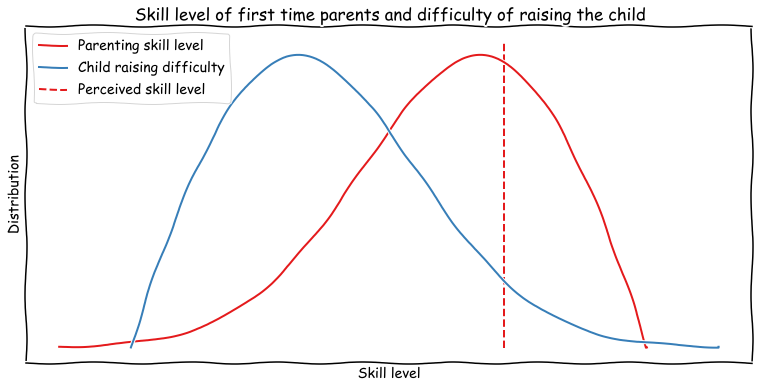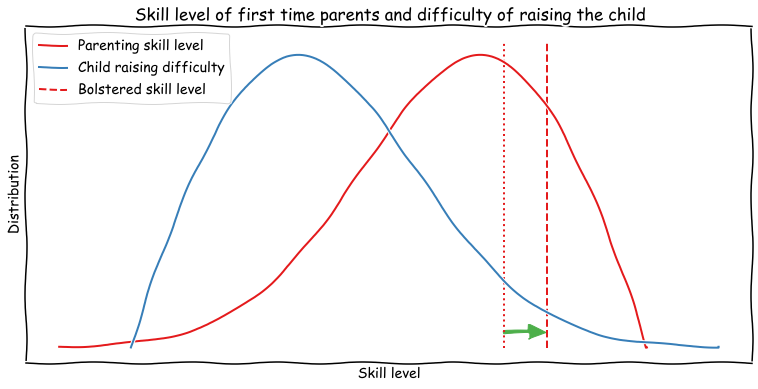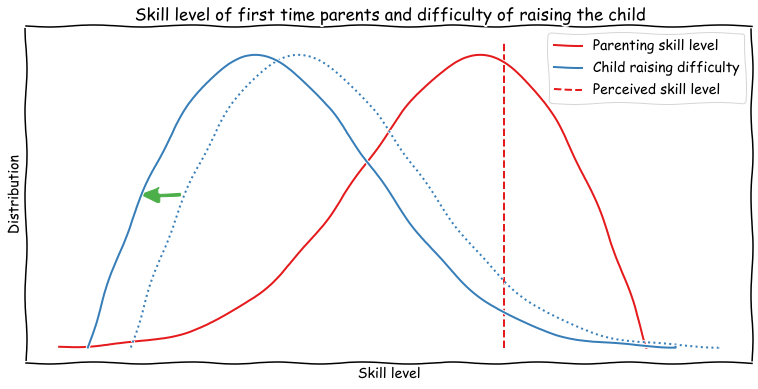Kinds of advice for first time parents
I recently became a parent. I was nervous. My friends helped me through that. By giving me advice and reassurances.
The way that helped me is I started thinking about what was bothering me and I came up with a sort of theory about the anxiety.
Modeling skill difficulty of parenting
Imagine a difficulty scale on which one can put the skill level of parents and the “hardness” of raising a child successfully. If the skill level of the parent is above the difficulty of raising the children, then the parent will achieve success. This obviously is a very reductive view of the skills, but bear with me.

Then I propose that the distribution of children and first time parents looks like the figure above.
- The median skill level of first time parents has to be higher than the median difficulty of raising a child. Because I am an optimist and humanity doesn’t seem to be dying.
- There is a hard cut-off of the skill level of first time parents. Even if one spends the entire life just preparing for that, one cannot know everything.
- There is a minimum difficulty of raising a child. This is because we know for sure children don’t survive if left uncared for.
- There is a long tail of difficulty of raising children, because I am a realist and there are some children who, unfortunately, cannot be “successfully” raised irrespective of the skill level of the parents.
The exact functional form of the curves does not matter much, and I’m taking liberty with the definition of “success” here.
As a parent, one has a perceived (latent) skill level, denoted by the dashed line. It is slightly above average because almost everyone thinks that they are above average.
A quantitative measure of anxiety of the parent is the area under the curve where the difficulty of raising a child is greater than the skill level of the parents.
Advice 1: “Your skill level is good”
This advice best comes from close friends who are likely to know you well. It improves the perceived skill level of the parent, and thereby reduces the anxiety because the area under the curve beyond the skill level decreases.
It comes in many forms, including but not limited to:
- “You are going to be great parents because …X”
- “Wow, you sound really prepared! Much more than others …”
- “You have been raised well by your parents, you’ll be able to raise your kids well too.”

Advice kind 2: “The baby-raising game is easy”
This is the advice which best comes from existing parents. It translates the perceived difficulty of raising children in general and again helps reduce anxiety because less of the area under the curve lies beyond the perceived skill level of the parent.
It too comes in many forms, including but not limited to:
- “Babies are very sturdy.”
- “Humanity has been raising kids since forever, you will be fine.”
- “Babies are really good at asking for help. Loudly. If something is wrong, they’ll let you know.”

Conclusion
Different advice works from different folks. However, in general, advice of kind 2 is better than advice of kind 1 because of the simple reasons:
- There is a hard cap on how good a first parent’s skill level can be.
- (Almost) Everyone thinks they are above average already.
So there is not much space for improving the perceived latent skill level. On the other hand, the difficulty of raising a child has more “give”, and can be reduced much more.
Anyway, so thinking about this is how I managed my own anxiety.